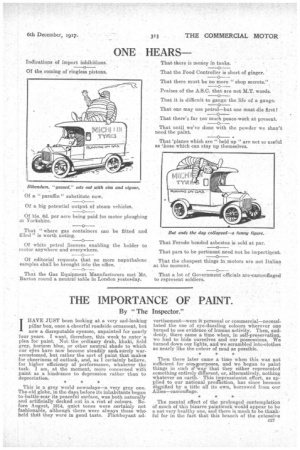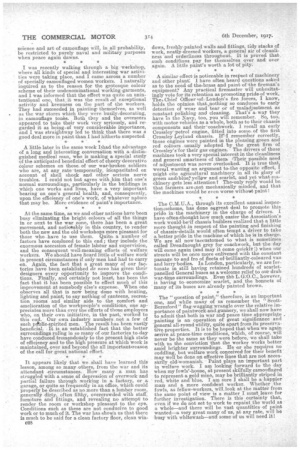THE IMPORTANCE OF PAINT.
Page 7

Page 8

If you've noticed an error in this article please click here to report it so we can fix it.
By "The Inspector."
IHAVE JUST been looking at a very sad-looking pillar box, once a -cheerful roadside ornament, but now a disreputable eyesore, unpainted for nearly four years.I want, therefore, this week to enter'a, plea for paint. Notthe ordinary drab, khaki, field grey, horizon blue, or other neutral shade to which our eyes have now become steadily and surely waraccustomed, but rather the sort of paint that makes for cheeriness of outlook, and, as I certainly believe, for higher efficiency of performance, whatever the task. I am, at the moment, more concerned with paint as a hindrance to depression rather than to depreciation.
This is a grey world nowadays—a very grey one. The old globe, in the days before its inhabitants began to .battle-scar its peaceful surface, was both naturally and artificially decked out in .a riot of colours. Before August, 1914, quiet tones were certainly not fashionable, although there were always those who held that they were in good taste. Flaniboyant ad vertisement—were it personal or commercial—necessitated the use of eye-dazzling colours wherever one turned to see evidence of human activity. Then, suddenly, there came a time when, in self-preservation, we had to bide ourselves and our possessions. We turned down our lights, and we scrambled into.clothes as nearly like the colour of mud as possible.
Then there later came a time when this was not sufficient for ourepurposes, and we began to paint things in such a"way that they either represented something entirely different, or, Alternatively, nothing whatever on earth. This impressionist effort, as applied to our national production, has since become dignified by a title all its own, borrowed from our Allies—camouflage.
The mental effect of the prolonged contemplation of much of this bizarre paintwork would appear to be a not very healthy one, and there is much to be thankful for in the fact that this branch of the extensive science and art of camouflage will, in all probability, be restricted to purely naval and military purposes when peace again dawns.
I was recently walking through a big workshop, where all kinds of special and interesting war activities were taking place, and I came across a number of specially camouflaged women workers. I naturally inquired as to the reason for the grotesque colour scheme of their undenominational working garments, and I was informed that the effect was quite an unintentional one, that, it was the result .of exceptional activity and keenness on the part of the workers. They had succeeded in painting, themselves, as well as the war stores which they were busily.decorating, in camouflage tones. Both they and the overseers appeared to take their work very seriously, and regarded it as beings of very considerable importance, and I was straightway led to think that there was a good deal more in paint than I had hitherto suspected A little later in the same week Miad the advantage of a long and interesting conversation with a. distinguished medical man, who is making a special study of the antiCipated beneficial effect of cheery -decorative Colour schemes on those of our war-broken soldiers who are, at any rate -temporarily, incapacitated on account of shell shock and other serious nerve troubles. I could not but agree with him that one's normal surroundings, particularly in the buildings in which one works and lives, have a very important bearing on one's general health, and, consequently, upon the efficiency of one's work, of whatever Name that may be. More evidence of paint's importance.
At the same time, as we and other nations have been busy eliminating the bright colours ef all the things in or next to the war zone, there has been a great movement, and noticeably in this country, to render both the new and the old workshops more pleasant for those who have to use them. Quite, a number of factors have conduced to this end; they include the enormous accession of female labour and supervision, and the consequent well-meaning efforts of welfare workers. We should have heard little of welfare work in present circumstances if only men had had to carry on.Again, the fact that a great many of our face tories have been established de novo has given their designers every opportunity to improve the conditions. Finally, and certainly not least, has been the fact that it has been possible to effect much of this improvement at somebody else's expense. When one observes all that is now being done with heating, lighting and paint, to say nothing of .canteens, recreation rooms and similar aids to the comfort and amelioration of the workpeciple's conditions, one appreciates more than ever the efforts of those employers who, on their own initiative, in the past.; worked to this end.Our own industry numbers net a few of such p&lic-spirited men. The result has been vastly beneficial. • It is an -established fact that the better surroundings ruling in so many of our factories to-day have conduced tremendously to the present high state of efficiency and to the high pressure at which work is
maintained, over and beyond the all important-reasonof the call for great national effort.
It appears likely that we shall have learned this lesson, among so many others, from the war and its attendant circumstances. How many a man has struggled with a sense of depression of overwork and partial failure through working in a factory, or a garage, or quite as frequently in an office, which could properly be described as no more than a lumber room, generally dirty, often filthy, overcrowded with staff, furniture and fittings, and revealing no attempt to render the room or workshop pleasant to the eye. Conditions such as these are not conducive to good work or to much of it. The war has show'n us that there is much to be said for a clean factory floor, clean win dows, freshly-painted walls and fittings, tidy stacks of work, neatly-dressed workers, a general air of cleanliness and orderliness throughout. It is proved that such conditions pay for themselves over and over again. A little paint's worth a lot of pity.
A similar effect. is noticeable in respect of machinery and other plant: I have often heard questions asked as to the need of the.brass and paint of the fireman's equipment? Any practical firemaster will unhesitatingly vote for its retention as promoting pride of work. Thee Chief Officer of eLondon's fire .forces, I know, holds the opinion thatenothing so conduces to early detection of wear and tear or of maladjustment as constant polishing and cleaning. That's a. way they have In the Navy, too, you will remember. So, too, with motor vehicles as a whole, both as to their chassis components and their 'coachwork. I recall an early Crossley'petrol engine,. fitted into some of the first Crossley Leyland chassis. If' I remember correctly, tnose engines were painted in the pleasing green and red colour usually adopted by the great firm of Crossley'slor their gas-engines. The drivers of those machines took a very special interest in the cleanliness and general smartness of them % 'Their possible need of adjustment was never overlooked. It is true that, wereeI wanting an argument to.the opposite effect, I might cite agricultural machinery in all its glory of green andiblue7yellow and scarlet, and yet what -machinery. gets less attention Theeenly reply would be. that farmers areenot mechanically minded, and that the machines would be even worse without paint
The through its excellent annual inspec tionischeme, has done aegreat deal to promote this pride in the machinery in the charge of drivers. I have oftenethought how much easier the Association's work would.be'if chassis builders realized that a little more thought in respect of the painting and finishing of chassivdetails would often tempt a driver to take a better pride in the machine of which he is in charge. We are all now ia,ccustonaed to what is sometimes called Dreadnought grey for eoachwork, but 'the day will come again (and may it come quickly!) when our streets will be once more enlivened with the constant passage to and fro of fleets of-brilliantly-coloured van and lorry bodies. In London, particularly, we are fortunate in still havipg retained hundreds of scarletpanelled General buses as a welcome relief to our drab war-time surroundings. . Even thie L.G:O.C., however, is having to economize scarlet, and the bonnets of many of its buses are already painted brown.
The "question of paint," therefore, is an important one, and while many of as remember the ScottBeresford " flag-wagging:wrangle over the relative importance of pamtwork amigunnery, we shall now have to admit that both in war and peace time atpropriate painting is an operation of great significance and general all-round utility, quite apart from its preservative properties. It is to be hoped that when we again arrive at peace-time conditions, which, of course, will never be the same as they were before, we shall take with us the conviction that the worker works better amid brighter surroundings. He .or she requires no coddling, but welfare work conceived for their benefit may well be done on effective lines that are not necessarily old-womanish. Paint plays an important part in welfare work. I am looking forward to the day when my fowls'-house, at present skilfully camouflaged to represent a gold mine, may be brilliantly striped in red, white and blue, I am sure I shall be a happier mare and a more confident worker. Whether the fowls, as fellow-workers, will, look at the matter from the same point of view is a matter I must leave for further investigation. There is this certainty that, even if we do not set to work to repaint the world as a whole—and there will be vast quantities of paint wanted—a very great many of us, at any rate will be busy with whitewash—and some of us will need it
































